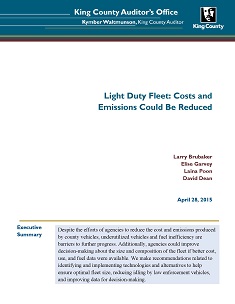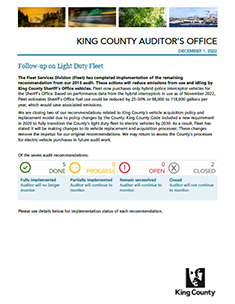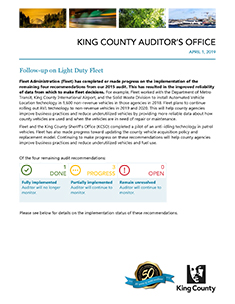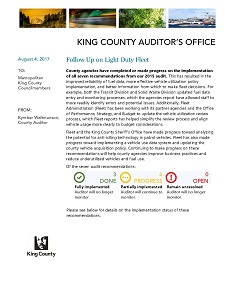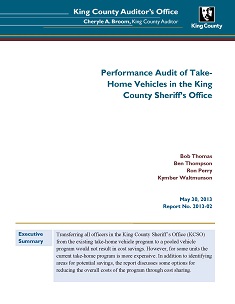Light Duty Fleet: Costs and emissions could be reduced
April 28, 2015
NEW! Download the latest follow-up report
Despite the efforts of agencies to reduce the cost and emissions produced by county vehicles, underutilized vehicles and fuel inefficiency are barriers to further progress. Additionally, agencies could improve decision-making about the size and composition of the fleet if better cost, use, and fuel data were available. We make recommendations related to identifying and implementing technologies and alternatives to help ensure optimal fleet size, reducing idling by law enforcement vehicles, and improving data for decision-making.
Status
Of the 7 recommendations:
| DONE | 5 | Recommendations have been fully implemented. Auditor will no longer monitor. |
|---|---|---|
| PROGRESS | 0 | Recommendations are in progress or partially implemented. Auditor will continue to monitor. |
| OPEN | 0 | Recommendations remain unresolved. Auditor will continue to monitor. |
| CLOSED | 2 | Recommendation is no longer applicable. Auditor will no longer monitor. |
Summary
This audit of light duty fleets aligns closely with King County Executive and Council policy priorities of fiscal responsibility and environmental impact. The county owns about 1700 light duty vehicles and spent more than $13 million on these vehicles in 2013. The audit focuses on how agencies make decisions related to the size and composition of their light duty fleet to best meet strategic goals.
Many vehicles are being driven fewer miles than required by the county’s minimum use policy, which is intended to rightsize the county fleet. The cost-efficiency of vehicles can also be measured by how much time a vehicle is in use or by the contribution of the car to county business needs, but decision-makers currently lack consistent data in these areas, which hampers efforts to ensure the most economic fleet size. As a result, fleet costs may be higher than necessary to provide reasonable transportation options for employees who travel to conduct county business.
Fleet Administration customers are using less fuel than in the past, but reducing idling by King County Sheriff patrol vehicles is key to further reductions in total county fuel use. Patrol cars use about the same amount of fuel per year idling as the total amount of fuel used by all other Fleet customers combined. In addition, a lack of consistent and accurate data on fuel consumption prevents decision-makers from realizing potential efficiency gains and ensuring progress toward environmental goals.
Finally, we determined that the lack of cost analysis when making high-risk vehicle purchasing decisions may contribute to higher-cost fleet selections.
We make seven recommendations to help decision-makers achieve county strategic goals through optimization of fleet size and vehicle performance. Recommendations touch on automating and enhancing vehicle data, making thorough utilization decisions, evaluating car-sharing options, reducing idle time, and rigorous evaluation of vehicle costs prior to purchases.
Reports related to this audit
Click on the image(s) below to view related reports.
|
May 30, 2013 |
Audit team
Larry Brubaker, Elise Garvey, Laina Poon, and David Dean conducted this audit. If you have any questions or would like more information, please call the King County Auditor's Office at 206-477-1033 or contact us by email KCAO@kingcounty.gov.

 Translate
Translate
